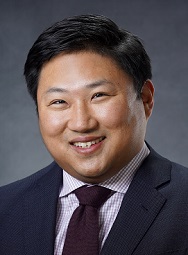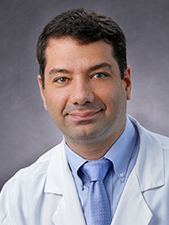The Digestive Health Institute at Cooper offers some of the most innovative and advanced therapies for treating gastrointestinal conditions—many of which are not offered elsewhere in South Jersey.

Daniel A. Baik, MD Interventional Gastroenterologist
“For many years, the treatment of many GI conditions required surgeries,” says Daniel A. Baik, MD, Interventional Gastroenterologist. “But through significant innovation over the past 10 to 20 years, we have learned to do much more from within solely using an endoscope, sometimes avoiding surgery altogether.”
Dr. Baik and his colleague, Adib Chaaya, MD, specialize in third-space endoscopy, whereby physicians access the deep layers of the gastrointestinal tract by dissecting and tunneling in the submucosal space.
Using special endoscopic knives, Dr. Baik and Dr. Chaaya perform endoscopic submucosal dissection (ESD) to explore and remove precancerous and early cancerous lesions in one piece. “With careful endoscopic removal of these tumors, there is the potential to offer a cure, without the need for surgery,” says Dr. Baik.
In addition, this technique allows pathologists to understand how deep the cancer is and provides accurate staging information. Cooper is the only hospital in South Jersey to perform this advanced procedure.
“No matter what type of cancerous lesion the patient has, small or large, the team approach at MD Anderson Cancer Center at Cooper allows us to precisely tailor treatment to what the patient needs,” adds Dr. Baik.

Adib Chaaya, MD
Interventional Gastroenterologist
Patients who have swallowing disorders such as achalasia may also benefit from a specialized procedure called E-POEM (esophageal peroral endoscopic myopathy). With this procedure, a tunnel is created in the wall of the esophagus, and the muscle that is preventing food from passing through is located and then cut from the inside. The tunnel is then closed to prevent any perforation. This procedure can be done without any surgical incisions.
A similar procedure, G-POEM (gastric peroral endoscopic myotomy), is used to treat gastroparesis, a slow-moving or paralyzed stomach. With this procedure, Dr. Baik uses the same tunneling procedure to find the end of the stomach (pylorus), just before it empties into the intestines, and cuts the muscle to allow food to flow into the intestines more easily.
“Gastroparesis is very difficult to treat, with limited medications and surgical options,” says Dr. Baik. “Although it doesn’t provide a complete cure, G-POEM offers an incision-free, relatively safe procedure that improves the quality of life for patients who have run out of options.”
Dr. Baik and Dr. Chaaya are also skilled in treating pancreatitis by inserting AXIOS stents. In the most severe cases, a portion of the pancreas may die off and turn to liquid, which pools in the abdomen, often near the stomach. These conditions (pancreatic pseudocysts, walled-off pancreatic necrosis) can be difficult to manage.
“Surgery for this condition can be quite difficult and complicated,” says Dr. Baik. “Instead, we can place an AXIOS stent endoscopically through the wall of the stomach and drain the fluid. We can also use the stent to access the pancreas and remove any dead tissue.”
Another innovative procedure known as endoscopic suturing has proven helpful in remodeling the stomach for patients who have gained weight after gastric bypass, repairing holes in the GI tract, and closing off abnormal connections (fistulas) to other organs. He also specializes in the treatment of complex pancreaticobiliary diseases and performs the breadth of EUS and ERCP procedures.
Dr. Baik is proud of the wide array of advanced procedures and the expertise of the practitioners at the Digestive Health Institute.
“When someone comes to us, they can be sure that we have a physician who has devoted their life to their specific condition or a specific procedure,” he says. “We work together to come up with the best plan for each patient. I think that’s what makes our center special. We’re prepared to handle anything that comes our way.”
For more information on advanced endoscopy services, or to refer a patient, contact Dr. Baik at 908.331.0550 (mobile), 856.642.2133 (office), or 856.642.2134 (fax).
